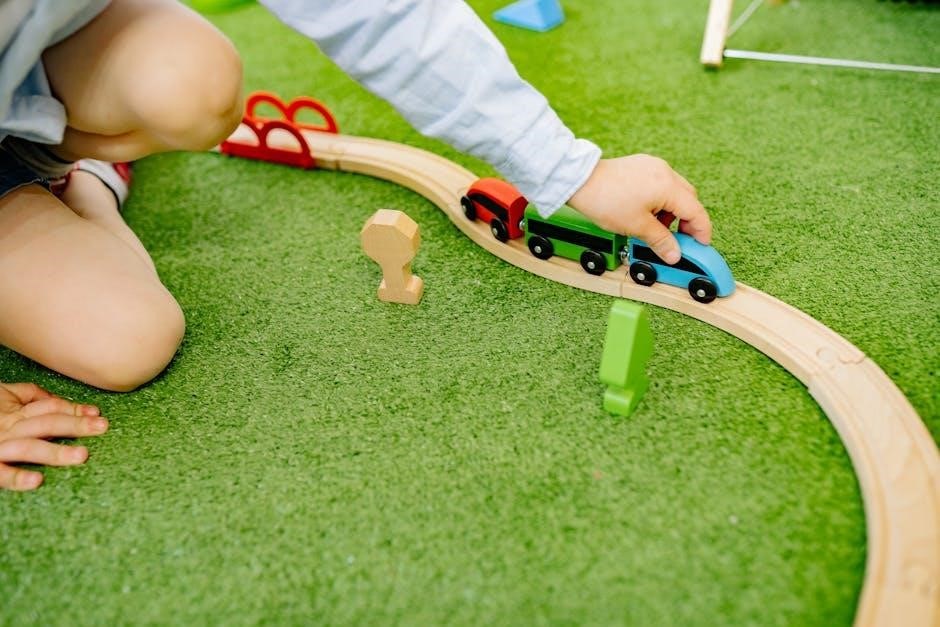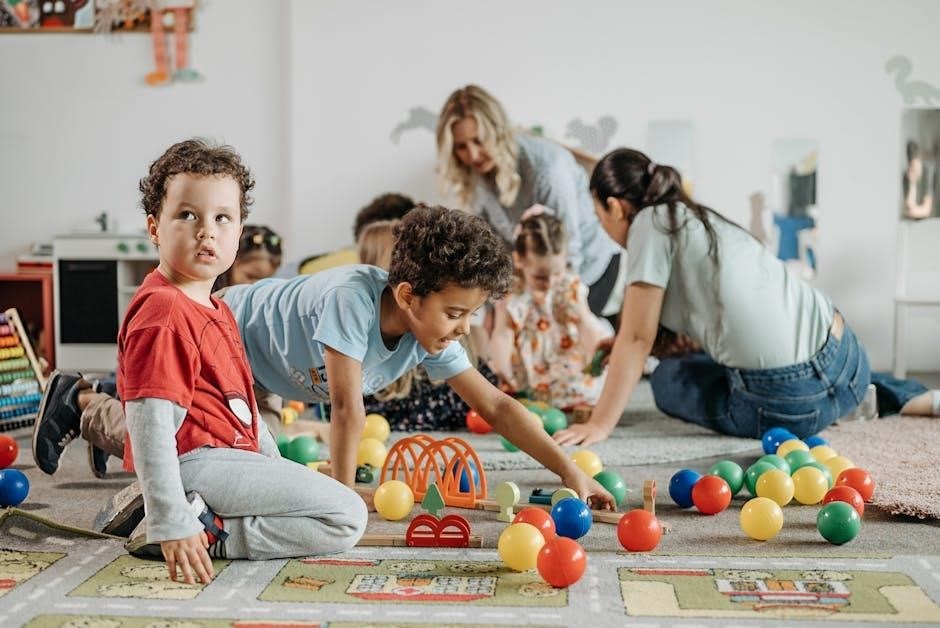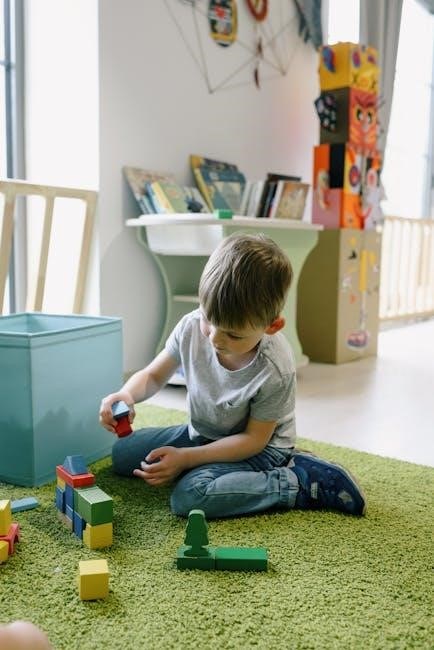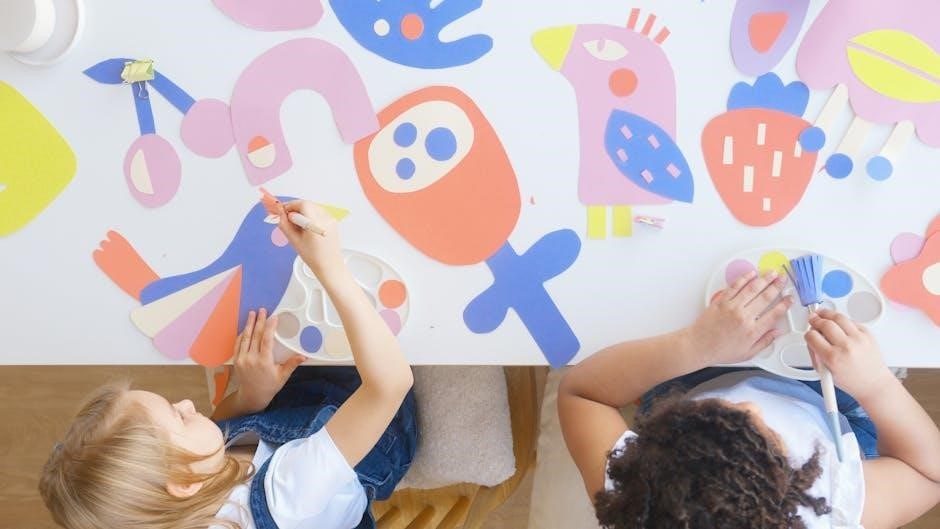
Playing Preschool Year 1 is a comprehensive, 190-day homeschool curriculum designed for at-home, play-based learning. It offers creative activities, themed units, and hands-on projects to foster early skills like math, reading, and science, while promoting social and emotional growth in children aged 2.5 to 5 years old.
1.1 Overview of the Curriculum
The Playing Preschool Year 1 curriculum is a 190-day program designed for children aged 2.5 to 5 years old, focusing on play-based learning. It includes themed units, hands-on activities, and projects that integrate math, reading, and science. The curriculum is structured to promote creativity, social skills, and emotional growth through engaging and interactive experiences. Available as a free PDF download, it offers a flexible and comprehensive approach to early childhood education.
1.2 Importance of Play-Based Learning
Play-based learning is essential for early childhood development, fostering creativity, problem-solving, and critical thinking. It allows children to explore and understand their world naturally, building confidence and independence. This approach encourages social interaction, emotional growth, and foundational skills like math and reading. By integrating play into education, the curriculum ensures a engaging and effective learning experience, preparing children for future academic success while nurturing their curiosity and creativity.
1.3 Why Choose Playing Preschool Year 1?
Playing Preschool Year 1 offers a unique blend of play-based learning with structured activities, making it ideal for homeschooling. The program’s 190-day curriculum is designed to engage children aged 2.5 to 5 with themed units, hands-on projects, and essential skills in math, reading, and science. Its flexibility and focus on creativity, social development, and academic preparation make it a standout choice for early education at home.

Target Audience and Age Range
Playing Preschool Year 1 is designed for children aged 2.5 to 5 years old, focusing on early learning through play. It’s ideal for parents and educators seeking a structured yet flexible homeschool curriculum.
2.1 Who is Playing Preschool Year 1 Designed For?
Playing Preschool Year 1 is specifically designed for children aged 2.5 to 5 years old, catering to their developmental needs through playful learning. It is ideal for parents, homeschoolers, and educators seeking a structured yet flexible curriculum. The program supports early childhood education by providing engaging activities that promote cognitive, social, and emotional growth, making it perfect for families or schools embracing play-based learning.
2.2 Age Range: 2.5 to 5 Years Old
Playing Preschool Year 1 is tailored for children aged 2.5 to 5 years old, ensuring age-appropriate activities that align with their developmental stages. This range allows for a smooth transition from toddlerhood to early school readiness, with lessons designed to be both challenging and achievable, fostering a love for learning through play and exploration. The curriculum supports each child’s unique pace and growth.
2.3 Learning Objectives for the Program
Playing Preschool Year 1 aims to develop foundational skills in math, reading, and science through playful, engaging activities. It fosters creativity, critical thinking, and social-emotional growth, preparing children for future academic success. The program encourages curiosity, independence, and confidence, laying a strong foundation for kindergarten and beyond while promoting a lifelong love of learning through hands-on experiences and imaginative play.
Curriculum Structure and Components
The curriculum features themed units, hands-on activities, and projects that integrate math, reading, and science. It includes free PDF downloads and uses everyday household items creatively.
3.1 Themed Units for Engaging Learning
The curriculum uses themed units to captivate young learners, making learning fun and immersive. Each theme, such as seasons or animals, is explored through play, art, and stories, ensuring a well-rounded experience. These units are designed to spark curiosity and engagement, helping children connect new concepts to their everyday lives in a meaningful way.
3.2 Hands-On Activities and Projects
Hands-on activities and projects are central to the curriculum, encouraging active learning through crafts, science experiments, and interactive games. These activities promote creativity and problem-solving while reinforcing academic skills. Parents can easily implement these projects using everyday materials, making learning accessible and enjoyable for children, and fostering a love for exploration and discovery from an early age.
3.3 Integration of Math, Reading, and Science
The curriculum seamlessly integrates math, reading, and science through themed units and hands-on activities. Children engage in counting games, storytelling, and simple experiments, making learning fun and interactive. These activities are designed to build foundational skills, encouraging curiosity and exploration while preparing young learners for future academic success in a playful and accessible way.
Benefits of the Program
Playing Preschool Year 1 fosters creativity, enhances social-emotional growth, and builds foundational academic skills through play-based learning, preparing children for future success while making education enjoyable.
4.1 Fostering Creativity and Critical Thinking
Playing Preschool Year 1 encourages creativity through hands-on activities and themed units, allowing children to explore and express ideas freely. Critical thinking is nurtured via problem-solving games and imaginative play, helping kids develop logical reasoning and innovation skills. These engaging experiences prepare young learners to think creatively and approach challenges with confidence, laying a strong foundation for lifelong learning and intellectual growth.
4.2 Building Social and Emotional Skills
Playing Preschool Year 1 emphasizes social-emotional development through interactive play and group activities. Children learn empathy, cooperation, and self-awareness while engaging in themed units and hands-on projects. The curriculum encourages emotional regulation, conflict resolution, and teamwork, fostering a sense of community and confidence. These skills are vital for building strong relationships and preparing children for future social interactions and academic success.
4.3 Preparing for Future Academic Success
Playing Preschool Year 1 lays a strong foundation for future academic success by integrating math, reading, and science through play. Hands-on activities and themed units encourage curiosity and problem-solving, while structured learning builds confidence. The curriculum’s gradual progression of skills ensures children are well-prepared for kindergarten and beyond, fostering a love for learning and equipping them with essential knowledge and abilities for long-term educational achievement.

How to Implement the Curriculum
Implementing Playing Preschool Year 1 involves creating a structured yet flexible daily routine, organizing play-based activities, and utilizing the provided materials to foster engaging and effective learning experiences.
5.1 Setting Up a Play-Based Learning Environment
Creating a play-based learning environment involves organizing space to encourage exploration and creativity. Use themed units and hands-on activities to engage children. Incorporate everyday household items and educational materials to foster curiosity and active learning. Ensure the space is safe, accessible, and stimulating, allowing children to freely explore and develop essential skills through play.
5.2 Daily Schedule and Routine Tips
A structured yet flexible daily schedule is key to play-based learning. Balance active play with structured activities like circle time, snacks, and outdoor exploration. Incorporate themed units to maintain engagement. Consistency helps children feel secure, while flexibility allows for spontaneous learning moments. The curriculum’s PDF provides sample schedules and tips to adapt routines according to your child’s needs and interests.
5.3 Encouraging Parental Involvement
Encourage parents to actively participate in their child’s learning by sharing daily activities and progress. Provide them with accessible resources, such as the free PDF downloads, to guide their involvement. Foster collaboration by creating opportunities for parents to contribute to themed units or hands-on projects. This shared involvement strengthens the learning process and builds a supportive environment for the child’s development.

Resources and Materials Needed
The program provides free PDF downloads, themed units, and activity guides. Utilize everyday household items to create engaging, cost-effective learning experiences for your child.
6.1 Required Materials for Activities
The curriculum requires basic art supplies, educational toys, and household items. Free PDF downloads are available, offering activity guides and themed unit materials. These resources are designed to be accessible and cost-effective, ensuring engaging learning experiences for children. The program emphasizes creativity, making it easy to adapt activities with items you likely already have at home.
6.2 Free PDF Downloads and Supplements
Playing Preschool Year 1 offers free PDF downloads, including activity guides and themed unit materials. These supplements are designed to enhance learning experiences with engaging content. Rated 4.3/5, the PDF has been downloaded over 36,000 times, making it a popular choice for homeschooling. Additional resources like scientific reports are also available, providing a wealth of material to support your child’s educational journey.
6.3 Utilizing Everyday Household Items
Playing Preschool Year 1 encourages creativity by using everyday household items for learning. Items like containers, fabrics, and kitchen utensils can become tools for hands-on activities. These familiar objects help children engage in imaginative play and problem-solving. By repurposing household materials, parents can create a cost-effective and interactive learning environment that fosters creativity and curiosity in young learners while promoting a fun and practical approach to education.
Skill Development Through Play
Playing Preschool Year 1 fosters essential skills through play, enhancing motor coordination, language development, and problem-solving abilities. Play-based activities encourage creativity and social interactions, preparing children for lifelong learning.
7.1 Motor Skills and Coordination
Playing Preschool Year 1 enhances motor skills through hands-on activities like puzzles, drawing, and building with blocks. These tasks improve fine motor abilities, while outdoor play and movement games develop gross motor skills. The curriculum’s structured, play-based approach encourages children to practice coordination through activities like stacking toys, using playdough, and balancing. This fosters physical confidence and dexterity, preparing them for more complex tasks as they grow.
7.2 Language and Communication Development
Playing Preschool Year 1 fosters language and communication skills through engaging activities like storytelling, role-playing, and verbal exchanges during play. Themed units encourage children to express thoughts and ideas, enhancing vocabulary and comprehension. Interactive games and group discussions promote active listening and clear articulation, preparing young learners for effective communication in future academic and social settings.
7.3 Problem-Solving and Logical Thinking
Playing Preschool Year 1 enhances problem-solving and logical thinking through hands-on activities and interactive games. Puzzles, themed challenges, and creative projects encourage children to explore cause-and-effect relationships and develop critical thinking. These engaging experiences help build foundational skills for tackling academic challenges and foster a curiosity-driven approach to learning and exploration.
Assessing Progress and Growth
Assessing progress involves observing developmental milestones and using play-based evaluations. This approach tracks growth over time, ensuring alignment with early learning goals and fostering a nurturing environment.

8.1 Observing Developmental Milestones
Observing developmental milestones in children is crucial for understanding their progress. Through play-based activities, educators can monitor improvements in motor skills, language development, and problem-solving abilities. Regular observation helps identify areas where additional support may be needed, ensuring each child meets their full potential. This method creates a nurturing environment tailored to individual growth and learning needs, fostering a strong foundation for future success. Playful assessments make this process both effective and enjoyable for young learners, allowing them to thrive naturally.
8.2 Using Play as a Tool for Assessment
Play is an effective tool for assessing children’s skills and understanding in a natural, engaging manner. Through play, educators can observe problem-solving abilities, creativity, and social interactions. This approach provides authentic insights into a child’s developmental progress, offering a stress-free method of evaluation that aligns with the play-based learning philosophy of Playing Preschool Year 1. It helps identify strengths and areas needing support, fostering a nurturing environment for growth.
8.3 Tracking Progress Over Time
Tracking progress over time in Playing Preschool Year 1 involves consistent observation of children’s participation in hands-on activities and themed units. The curriculum provides a structured 190-day program, allowing parents and educators to monitor developmental milestones and skill mastery. Regular engagement with math, reading, and science activities ensures measurable growth, while creative play fosters creativity and social-emotional development, offering a comprehensive view of a child’s learning journey throughout the year.
Playing Preschool Year 1 offers a transformative play-based learning experience, fostering creativity, social skills, and academic readiness in young children. Its structured yet flexible design ensures a strong foundation for future success, making it an excellent choice for homeschooling families seeking engaging and effective early childhood education.
9.1 Final Thoughts on the Program
Playing Preschool Year 1 is a dynamic and engaging curriculum that offers a balanced approach to early childhood education. Its emphasis on play-based learning ensures children develop essential skills while fostering creativity and curiosity. The program’s flexibility and accessibility, including free PDF downloads, make it an excellent choice for families seeking a structured yet fun homeschool experience. It truly prepares young learners for future academic and personal success.
9.2 Encouraging Lifelong Learning Through Play
Playing Preschool Year 1 nurtures a lifelong love for learning by embedding education in playful experiences. Through themed units and hands-on activities, children develop creativity, curiosity, and a natural desire to explore and understand their world. This approach fosters resilience, adaptability, and a joy for discovery, laying a strong foundation for future academic and personal growth. Play becomes the catalyst for a lifetime of learning and adventure.
9.3 Next Steps After Completing Year 1
After completing Year 1, children are well-prepared to transition into more structured learning. Parents can continue with advanced play-based programs or explore formal kindergarten options. The curriculum’s foundational skills in math, reading, and science provide a smooth pathway for future academic success. Families can also access additional resources, like free PDF downloads, to support ongoing learning and playful development, ensuring a seamless progression in their child’s educational journey.





